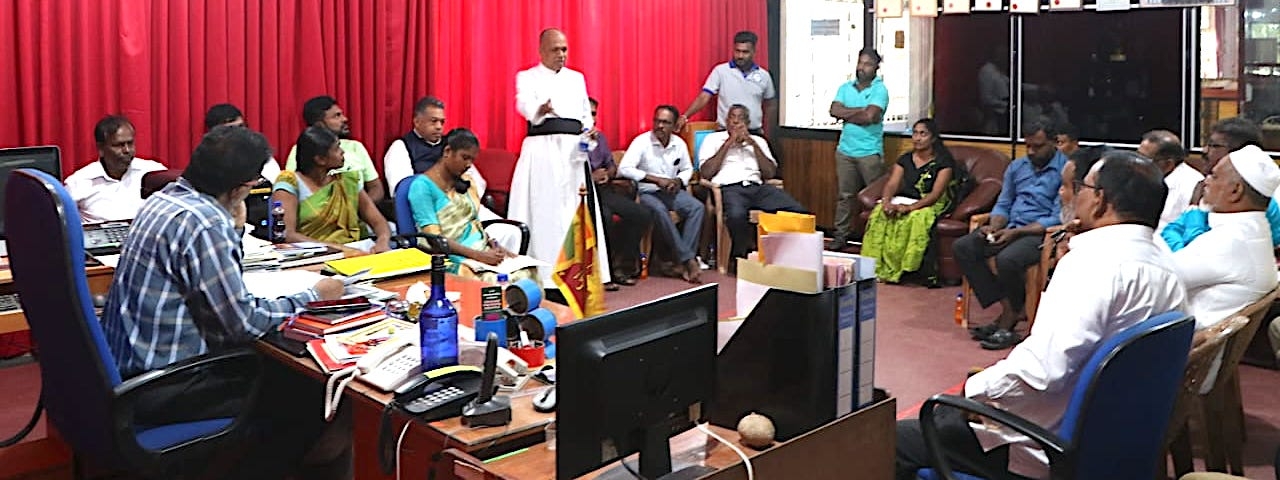Mannar and Vavuniya Local Inter Religious Committee (LIRC) members intervened to settle a dispute between two villages in their districts and prevented religious differences from turning into violent conflict while minimising the possibility of conflicts recurring over religious issues. The initiatives were taken under NPC’s project Action for Religious Coexistence (ARC).
There is a tendency for violence when multi ethnic communities clash due to a lack of knowledge and mistrust of the other's religion. LIRCs have a responsibility to promote religious freedom and coexistence by addressing prevailing inter-religious and inter-ethnic tension. To eliminate potential conflicts, it is crucial to identify and address existing issues as soon as possible, so mediation and conflict mitigation are crucial skills that committee members need to practice.
Mannar LIRC members identified a dispute between two villages, Naruwalikkulam and Wangalei, in the Nanattan Divisional Secretariat Division. Residents of Nanattan are from different ethno-religious communities. Wangalei is an area where the majority is Roman Catholics while in Naruwalikkulam the majority belongs to non-Roman Catholic denominations. There had been no reports of any major problems in the past.
The conflict arose when non-Roman Catholics in Naruwalikkulam attempted to build a church in their village which Roman Catholics in Wangalei considered a threat to their religion; news of building an arch in Naruwalikkulam further escalated the tension. Relations among communities were tense and there was little or no contact between the people. Mannar LIRC decided to take action to reconcile the two sides before the situation escalated into violence.
When Mannar LIRC met to discuss interventions, committee members decided to visit the communities in both villages. After that, with the participation of villagers, LIRC had a discussion at Nanattan Divisional Secretariat with the participation of Divisional Secretary, Sri Shantha Kumar. During the meeting committee members said that a lack of knowledge about other religions had led to the conflict situation and discussed how the issue could be solved in a non-violent manner. Both village communities agreed on the importance of resolving issues through negotiations to ensure mutual respect for other religions. The participants agreed on some solutions to appease the communities in both villages while encouraging them to collectively resolve their problems with empathy and compassion.
Palamakal is located in the Nelukkulam Grama Niladhari division in the Vavuniya District. The majority of villagers are Hindu. A preacher from an unknown sect recently rented a house in Palammakkal and started to broadcast loud prayers, even at night, disturbing the villagers, who saw this as an unusual activity since there were no Christians in the village. Following a needs assessment discussion, Vavuniya LIRC engaged in a dialogue with the preacher and the villagers to resolve the issue. A few solutions were put forward by the participants while highlighting the importance of negotiations and mutual understanding among communities for sustainable peace in the area. The preacher agreed to broadcast his prayers without disturbing others while accepting that religious freedom should not harm others’ freedom.
LIRC members decided to continue their interventions until solutions were reached for both issues. The villagers were ready for discussions as they did not want to live in a conflict situation. NPC will be provide a common platform through the ARC intervention to solve the problems through community level dialogue.
Through community level initiatives, LIRC members will experience how to use mediation skills and knowledge they obtained through the Collective Engagement for Religious Freedom intervention. As a result of these initiatives, the project successfully brought together people of different religions to one platform, creating the opportunity to accept and acknowledge the pluralistic nature of society.

